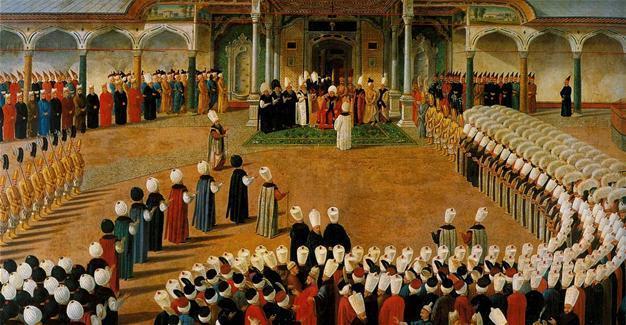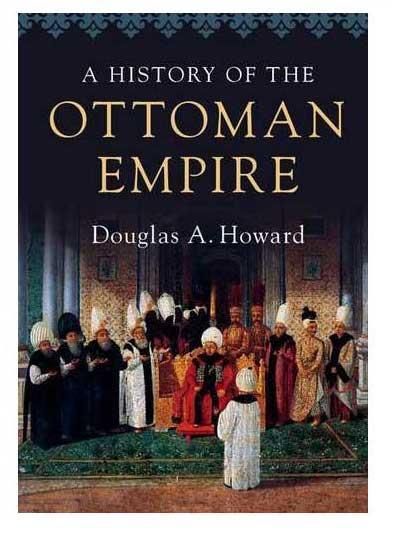A history of the Ottoman ‘worldview’
William Armstrong - william.armstrong@hdn.com.tr

‘A History of the Ottoman Empire’ by Douglas A. Howard (Cambridge University Press, 393 pages, $35)
Ottoman history has rarely been more popular in Turkey than it is today. It has also rarely been more politicized. Many on the Islamic conservative right are only interested in the history of the Ottoman Empire if it can be crammed into a narrow contemporary agenda. People who find the complicated, contradictory historical record too messy are happy to distort it to fit a more flattering agenda. In the process, the many subtleties of Ottoman history - the chaotic diversity and contradictions that make it such a fascinating subject - get flattened out.
 “A History of the Ottoman Empire” by Calvin College historian Professor Douglas Howard is the latest single-volume English-language treatment of over six centuries of the Ottoman imperial dynasty. It is not intended as a corrective to popular histories in today’s Turkey (the audience is completely different). But academic rigor is anathema to such dubious history. Coming amid the misunderstood Ottomanism of today’s political fantasists, it is a welcome palette cleanser.
“A History of the Ottoman Empire” by Calvin College historian Professor Douglas Howard is the latest single-volume English-language treatment of over six centuries of the Ottoman imperial dynasty. It is not intended as a corrective to popular histories in today’s Turkey (the audience is completely different). But academic rigor is anathema to such dubious history. Coming amid the misunderstood Ottomanism of today’s political fantasists, it is a welcome palette cleanser.
 “A History of the Ottoman Empire” by Calvin College historian Professor Douglas Howard is the latest single-volume English-language treatment of over six centuries of the Ottoman imperial dynasty. It is not intended as a corrective to popular histories in today’s Turkey (the audience is completely different). But academic rigor is anathema to such dubious history. Coming amid the misunderstood Ottomanism of today’s political fantasists, it is a welcome palette cleanser.
“A History of the Ottoman Empire” by Calvin College historian Professor Douglas Howard is the latest single-volume English-language treatment of over six centuries of the Ottoman imperial dynasty. It is not intended as a corrective to popular histories in today’s Turkey (the audience is completely different). But academic rigor is anathema to such dubious history. Coming amid the misunderstood Ottomanism of today’s political fantasists, it is a welcome palette cleanser. The book is determinedly chronological and makes few concessions to narrative. But it is not without color. At times Howard writes with flair, as in the first sentence of the first chapter: “The rains were heavy that spring and the Sangarius River overflowed its banks, seeking out its former bed under a long-abandoned bridge.” Later on, surveying the wreckage after the Greek retreat and the Great Fire of İzmir during Turkey’s independence war, we read that “imputations of blame on all sides spread as a kind of surrogate of sadness.”
From the 13th to the early 20th century, the Ottoman family enjoyed the longest span of uninterrupted dynastic sovereignty in world history. As a small Turkish state it clashed early on with the Byzantines, the Mongols, and other medieval powers. Howard’s book stresses that from the beginning the Ottoman center of gravity was Rumelia (the Balkans), not Anatolia. This remained the case throughout the empire’s 600-year history.
From today’s vantage point, it is tempting to see that history as one long Pax Ottomana, in which the ruling family held the reins of power with a ruthless iron grip. In fact, Ottoman history is more like a seemingly endless chronology of wars, mutinies, riots, disasters, epidemics and scandals. “Violence or the threat of violence became almost routine as a means of negotiating political change,” writes Howard. “In such constant political turmoil, the Ottoman sultans often appeared to have little day-to-day political or military authority.”
The book is punctuated by text boxes and appendices giving useful detours on various points of interest - cultural products, travelogues, Sufi poetry, memoirs. Running through the text is Howard’s stated aim to focus on what he calls the “Ottoman worldview.” This essentially means abandoning narrative-based history – not just the distorted visions of today’s political Ottomanists – in favor of how actors viewed events as they unfolded at the time. As a result, there is little talk of “rise and fall” or “golden ages.” For the casual reader, this ultimately makes for a more staid, less gripping read.
But drama is inherent in the empire’s protracted, bloody decline. Howard describes the period from July 1908 (when the general Şemsi Pasha was assassinated in Manastır), to August 1923 (when the Treaty of Lausanne was ratified by Turkey), as a “War of Ottoman Dissolution.” “A 600-year old empire was coming apart,” he writes, “and the empire’s diverse peoples, Turks, Kurds, Armenians, Greeks, Arabs, South Slavs and others, whose desires the revolution channeled, now fought intensely for control of its heritage.”
Unfortunately, Howard is restricted by the constraints of trying to fit everything into a single 300-page volume. The book thus has the dry seriousness of academic history but lacks the comprehensiveness of a multi-volume treatment. Many areas would benefit from expansion; we read about the first Ottoman Turkish printing press founded in 1726, but nothing about why it took so long; similarly, we read about how no Ottoman sultan ever went on the hajj but we are not told why.
On the whole, however, Howard martials his colossal material with skill. For those genuinely interested in the contradictions, intrigues and subtleties of Ottoman history, “A History of the Ottoman Empire” is a worthwhile read.
* Follow the Turkey Book Talk podcast via iTunes here, Stitcher here, Podbean here, or Facebook here, or Twitter here.
From the 13th to the early 20th century, the Ottoman family enjoyed the longest span of uninterrupted dynastic sovereignty in world history. As a small Turkish state it clashed early on with the Byzantines, the Mongols, and other medieval powers. Howard’s book stresses that from the beginning the Ottoman center of gravity was Rumelia (the Balkans), not Anatolia. This remained the case throughout the empire’s 600-year history.
From today’s vantage point, it is tempting to see that history as one long Pax Ottomana, in which the ruling family held the reins of power with a ruthless iron grip. In fact, Ottoman history is more like a seemingly endless chronology of wars, mutinies, riots, disasters, epidemics and scandals. “Violence or the threat of violence became almost routine as a means of negotiating political change,” writes Howard. “In such constant political turmoil, the Ottoman sultans often appeared to have little day-to-day political or military authority.”
The book is punctuated by text boxes and appendices giving useful detours on various points of interest - cultural products, travelogues, Sufi poetry, memoirs. Running through the text is Howard’s stated aim to focus on what he calls the “Ottoman worldview.” This essentially means abandoning narrative-based history – not just the distorted visions of today’s political Ottomanists – in favor of how actors viewed events as they unfolded at the time. As a result, there is little talk of “rise and fall” or “golden ages.” For the casual reader, this ultimately makes for a more staid, less gripping read.
But drama is inherent in the empire’s protracted, bloody decline. Howard describes the period from July 1908 (when the general Şemsi Pasha was assassinated in Manastır), to August 1923 (when the Treaty of Lausanne was ratified by Turkey), as a “War of Ottoman Dissolution.” “A 600-year old empire was coming apart,” he writes, “and the empire’s diverse peoples, Turks, Kurds, Armenians, Greeks, Arabs, South Slavs and others, whose desires the revolution channeled, now fought intensely for control of its heritage.”
Unfortunately, Howard is restricted by the constraints of trying to fit everything into a single 300-page volume. The book thus has the dry seriousness of academic history but lacks the comprehensiveness of a multi-volume treatment. Many areas would benefit from expansion; we read about the first Ottoman Turkish printing press founded in 1726, but nothing about why it took so long; similarly, we read about how no Ottoman sultan ever went on the hajj but we are not told why.
On the whole, however, Howard martials his colossal material with skill. For those genuinely interested in the contradictions, intrigues and subtleties of Ottoman history, “A History of the Ottoman Empire” is a worthwhile read.
* Follow the Turkey Book Talk podcast via iTunes here, Stitcher here, Podbean here, or Facebook here, or Twitter here.










